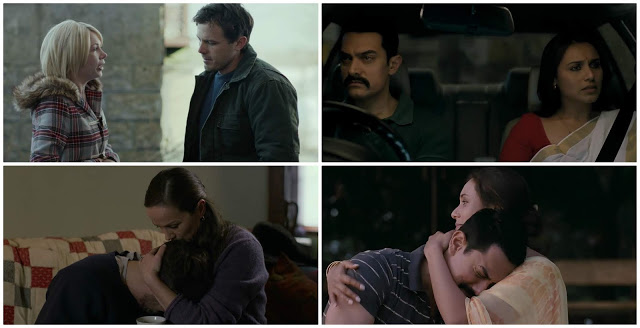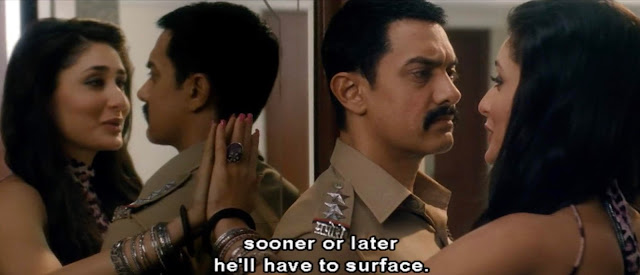In her memoir Epilogue, writer Anne Roiphe narrates her experience of rebuilding her life after being a widow. She writes, “Grief is in two parts. The first is the loss. The second is the remaking of life.” But what if you cannot move past the first stage and remain stuck there? Kenneth Lonergan’s melancholic Manchester By The Sea explores this concept of not being able to beat the grief of loss. Lee Chandler (Casey Affleck) is a lonely and a morose janitor working in Quincy, Massachusetts. He receives the news that his brother Joe (Kyle Chandler) has passed away. Lee travels to his hometown Manchester-By-The-Sea, Massachusetts, and learns that his brother has deputed him to be the guardian of his seventeen-year-old son Patrick (Lucas Hedges). Lee is taken aback as he feels that he is not capable of being a parent. Later, it is shown that Lee lost three of his children in a fire due to his inadvertent mistake which explains Lee’s refusal to become Patrick’s guardian and his hesitation to move back to Manchester-By-The-Sea as he has painful memories associated with his hometown.
The film uses a set of flashbacks to make sense of the past events associated with Lee’s life. Unlike the usual way as seen in other films, the flashbacks in this film are presented in a disjointed and a non-chronological way—much like the way how the mind remembers the past events. We know something terrible has happened to Lee but it is only around the midpoint of the film that we understand the reasons for his sadness.
It is often said that there is no pain greater than losing a child. Lee lost not one but three of his young children. How does one get over this? In the film’s most beautiful scene, Randi and Lee talk to each other. Randi apologizes for all the terrible things she told Lee earlier. She blamed him for the tragedy but realizes that she was wrong. It is a heartbreaking scene where both Randi and Lee are trying to say something but are not able to finish their sentences. Randi tells him, “My heart was broken. It’s always gonna be broken. I know your heart is broken, too.” She adds that he just cannot die, but Lee tells her that she should not feel like that because “there’s nothing there.” He just cannot “beat it.”
Manchester By The Sea showcases the usual randomness and the daily unpredictability of life during events of grief. Life does not calm down and objects do not behave the way we want them to in those moments. All through the film, there are scenes where it is shown that things keep going on the way they usually do. At an early moment in the film, the nurse cannot find the belongings of Joe in the hospital when Lee comes to see him. After visiting the funeral home, Lee is not able to remember where he parked his car. At Joe’s burial, Randi’s son starts crying at the cemetery prompting her husband to take him away to maintain silence. But the one scene where this aspect is most visible is the one right after the fire at Lee’s house. A few men are trying to put Randi in the ambulance; however, the gurney won’t function properly and will not go inside. They have to repeatedly try to force it inside. It is the most tragic scene in the film and the filmmaker adds to the tragedy by introducing a slight chaos in those moments of grief to convey the idea that the gurney does not know it should behave properly because it is a sad moment. In an interview, Kenneth Lonergan elaborates on this scene and says, “I think it’s great because it’s so awful. It’s not a soap opera moment where the whole world stops and waits for [the characters] to suffer. They’re really suffering and they can’t get the thing in the ambulance. Anyway, it’s just my attempt to make it as excruciating as possible.”
Everything in Manchester By The Sea is portrayed in a realistic manner. For a film full of sad moments, it still manages to add humor at the unlikeliest of places. The music in the film has an operatic feeling which makes grief feel more prolonged. I have not seen Kenneth Lonergan’s prior work but reviewers have observed that there has been a theme of melancholy and grief in his other films as well. The performance by Casey Affleck who plays Lee won him an Oscar. Michelle Williams who plays Randi is terrific in a small role.

Manchester By The Sea and Talaash depict the crushing guilt that grief brings along. Lee’s three children die in a fire that was caused due to his carelessness. After a party, he forgets to put a screen at the fireplace causing his house to burn down. At the police station, he is surprised that the inspectors let him go. He thought he would be incarcerated. The inspector tells him that it is not a crime to not put the screen at the fireplace. He made a mistake, like millions of other people do. As soon as Lee comes out, he grabs a pistol and tries to kill himself. He is consumed by the guilt that he could not be a good father and he tries to punish himself by living a life bereft of any joy. He moves to a dingy one-room apartment near Boston. He keeps entering into bar fights as he wants people to hit him as a punishment for his actions. He deliberately injures and inflicts pain on himself. In an emotional outburst, his wife Randi said terrible things to him blaming him for the tragedy. Later, she apologizes to him for the same and admits that she was wrong but Lee has internalized his guilt to the extent that he cannot let go. After Joe’s death, the main reason that Lee did not want to take care of Patrick was that he thought he could never be a father again. Hence, he expresses surprise when he learns about his brother’s last wish.
In Manchester By The Sea, Joe’s body is kept in a freezer as the ground is too hard in the winter to bury him in the cemetery. He will be buried in the spring when the ground thaws out. The delayed burial is also a symbolic representation of the delay in the processing of grief of the characters in the film. The film is set in the brutal winter of New England mirroring the coldness and numbness in Lee. He is closed to any human interaction after the death of his children. He refuses to meet and talk to women who are interested in him. He has become emotionally hard like the winter ground. There are many scenes of the icy landscape in the film invoking a feeling of chilling claustrophobia. When the spring arrives, the ground thaws and so does Lee. He works out a plan for Patrick’s future. He starts looking for a two-room apartment so that Patrick can stay with him when he comes to Boston. The turbulent tides pave the way to the calm waves. The film ends with Lee and Patrick going fishing as was seen in the film’s first scene.
There are some small common elements in the two films. In Manchester By The Sea, Lee communicates with the spirits of his children in his dreams and tells them they are not burning. In Talaash, Suri communicates with his son using the inexplicable supernatural powers of his neighbor. In both the films, there are boats that make an appearance. Patrick wants to keep his father’s boat even though he does not have the resources to maintain it. Karan went on a boat that accidentally started running causing him to drown.
Elisabeth Kübler-Ross famously postulated the five stages of grief with the last stage being acceptance. However, not all people can reach the five stages and are stuck somewhere in between. Lee and Suri are those people who are unable to reach that stage of acceptance. It is not clear how they will survive in the future but they have taken some small steps towards their future. After all, no one can really get over grief completely because as they say grief is like the ocean. It comes on waves ebbing and flowing. Sometimes the water is calm, and sometimes it is overwhelming. All we can do is learn to swim.
[For more of the author’s work, log onto his blog here]

















Leave A Comment
You must be logged in to post a comment.